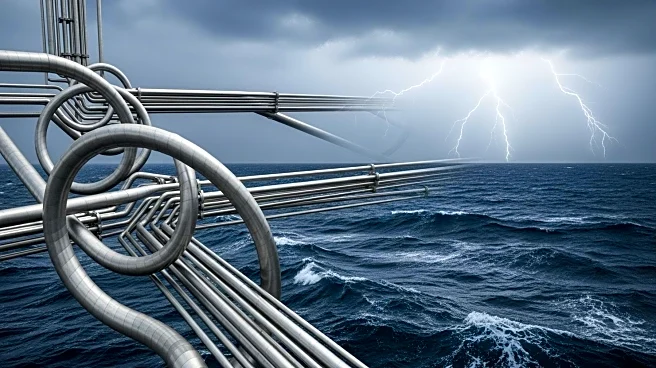What is the story about?
What's Happening?
TotalEnergies CEO Patrick Pouyanne expressed skepticism regarding the completion of all U.S. liquefied natural gas (LNG) projects that have received regulatory approval. Pouyanne highlighted the difficulty in securing long-term buyers and financing as major obstacles. He noted that while Asian clients are signing long-term contracts for U.S. LNG, their motivations are more political than economic, influenced by President Trump's push for increased American LNG purchases to address trade imbalances. Pouyanne has previously warned that the U.S. is constructing too many LNG plants, which could result in a prolonged market glut if all planned projects proceed.
Why It's Important?
The concerns raised by Pouyanne underscore potential challenges in the U.S. LNG sector, which could impact the energy market and trade relations. If financing and buyer interest remain insufficient, some projects may not materialize, affecting job creation and economic growth in regions dependent on LNG development. Additionally, a market glut could depress LNG prices, impacting profitability for companies involved. The political dimension, with President Trump's advocacy for increased LNG exports, highlights the intersection of energy policy and international trade dynamics.
What's Next?
The future of U.S. LNG projects will likely depend on evolving market conditions and geopolitical factors. Companies may need to reassess their strategies to secure financing and long-term contracts. Stakeholders, including government agencies and industry leaders, might explore policy adjustments or incentives to bolster project viability. The potential for a market glut could prompt discussions on balancing supply and demand, possibly influencing future regulatory decisions.
Beyond the Headlines
The situation raises broader questions about the sustainability of energy policies driven by political motives rather than market fundamentals. The emphasis on LNG exports as a tool for trade balance may face scrutiny if economic realities do not align with political goals. This could lead to a reevaluation of energy strategies and international trade agreements, impacting long-term energy security and economic stability.
















